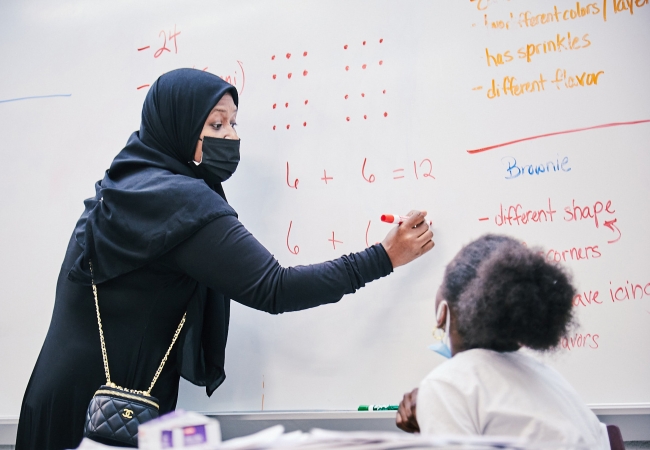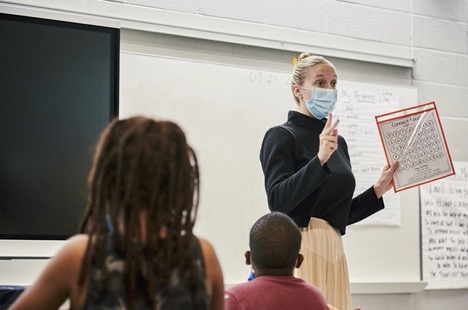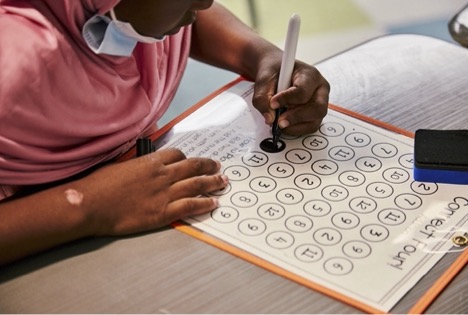From summer camp to game-filled festivals, Penn GSE makes math meaningful for West Philly kids

When Sheena Miles agreed to teach at this year's six-week summer program, a collaboration between Penn GSE and the Netter Center, she had one stipulation: No math.
"I said, 'I am not teaching math.' Math is not my thing," Miles said. But the program had already lined up its literacy teachers for the summer, so Miles eventually relented. Her reluctance turned into enthusiasm after a Zoom call with Joy Anderson Davis, of Penn GSE's Responsive Math Teaching project.
"Joy made me feel so comfortable," Miles said. "The way that RMT teaches math is phenomenal. It's not the traditional pencil on paper — it's about getting kids involved. We talk about the problems before we even start doing them. This makes the kids realize that we all see things differently, and that we can all arrive to the same answer despite seeing things differently."
Launched with a grant from the William Penn Foundation, the RMT project is currently funded by the National Science Foundation. The "responsive" aspect has to do with kids engaging in the work, rather than passively completing it. It's about conversation, both with the group and with a partner, and this format challenges the idea that math is based on memorizing multiplication sheets and struggling through equations at your desk. Partner work grounds the lessons in socialization and physical engagement, as opposed to isolation and abstraction. This makes math come to life through dialogue, teamwork, and joint problem-solving.
"The kids love it, they really do. They get into it," said Miles, who teaches special education at Hamilton Elementary during the school year. "I've talked to my principal and told him I'm bringing these things into my class in the fall."
This story represents what Penn GSE's RMT project is all about. "We teach the teachers, and we build a community of teachers and principals who are excited about it," said Caroline Ebby, an expert in math education who is a senior researcher at the Consortium for Policy Research in Education. "It's about changing the way that math instruction happens in schools, building from the ground up with teachers and with support from their schools."
Funded by the National Science Foundation, the RMT project works with teachers and leaders from 14 local schools, including 12 in West Philadelphia. The primary goal is to build the capacity of elementary teachers to serve as instructional leaders. To start, teachers become immersed in responsive teaching by experiencing it themselves as learners. As they start to bring new approaches into their classroom practice, they meet with other teachers to collaboratively plan and reflect on responsive lessons. Some then move into leadership roles as school-based leaders and/or professional development facilitators. "We are not just assigning them to be leaders," said Ebby, "we mentor them to become leaders. We give them the capacity and the skills to do it."
 Nicole Mitchell, a 2021 Penn GSE graduate of the UTAP program, teaches RMT lessons at Hamilton Elementary in July
Nicole Mitchell, a 2021 Penn GSE graduate of the UTAP program, teaches RMT lessons at Hamilton Elementary in July
 A student does RMT lessons at in Nicole Mitchell’s class at Hamilton Elementary in the summer.
A student does RMT lessons at in Nicole Mitchell’s class at Hamilton Elementary in the summer.
Excited and inspired teachers? Check. Engaged and empowered kids? Present. But there was a missing link: How do you get parents excited about math? After all, when kids get stuck in a homework problem, they often turn to parents for help. "Their parents have their own questions, fears, and anxieties around mathematics," said Davis. "We wanted to include parents as a way of broadening our focus, not shifting our focus."
Last summer, a GSE alum stepped in to help them reach these parents. Daniel Kline, M.Ed. '19, reached out to the RMT project about hosting math festivals, events designed for kids and parents to play math-based games together. A former math teacher, Kline is now the executive director of the California-based Julia Robinson Math Festival Foundation. Math festivals provide a low-risk, high-ceiling opportunity: everyone can access the games, and everyone can learn a lot by playing them.
"This says to parents, 'Come do math with your kids. Let’s all do it together,'" said Ebby. "It's another way of leveling the field for parents who don’t always feel welcome in school environments."
This August, the RMT project ran math festivals at the Penn Alexander School and Hamilton Elementary, serving kids grades 2-8 and their parents. They also held festivals at Lock Elementary, Gompers Elementary, and Lamberton Elementary this summer, and they have more planned for the fall.
"The festivals focus on play and exploration, on making kids wonder and think," said Davis. "When you play, you talk and you laugh and you work together with people, and you find many different entry points to math.”
Math-based games include river crossings, mazes, cup stacking, map coloring, and apple picking. All the games are inherently mathematical, despite being so fun. Second-graders and seventh-graders could play the same game, but approach it differently.
"The reason that traditional math doesn’t engage many learners is that it focuses on one way to do things," said Davis. "It focuses on correct answers, and it focuses on speed. But that’s just one piece of it. Math can be accessible and available for all of us."
One student may thrive in logic skills, while another does better with observation (“Which one of these doesn't belong?"). Others may do well in writing, or in critical thinking, or in measuring and graphing. Math involves all of these skills, it's just that some methods of teaching math overlook certain skills and overvalue others. The math festivals invite the left-behind skills back to the table.
That's not to say that math games are easy. They can challenge a student as much as they charm them. Math takes intellectual muscle, and struggle builds that muscle. With each game or puzzle, the muscle grows. “We need to normalize this struggle and engage it,” said Davis. She recalled one student who strolled into a festival with a basketball under his arm, seemingly skeptical about the event. Soon enough, the student had spent 45 minutes racking his brain at the cup stacking station, eventually realizing that his best bet was to talk through strategy with another student. "Instead of being something that pushes people away, math became something that pulls people together," Davis said.
The RMT project is currently in its final year of NSF funding. "We succeeded at what we set out to do, which was to support the development of teacher leaders within each elementary school and now we have a sustainable program," Ebby said. "We are actively looking for funding to expand this approach so we can have a broader impact on more schools as well as families and community members."
Whether it's at a math festival or in a classroom, the RMT project is changing the way teachers, students, parents, and schools think about math instruction and the subject of math in general. Follow their work at gse.upenn.edu/academics/research/responsive-math-teaching.
Top image: Sheena Miles teaches with the Responsive Math Teaching curriculum at the OSCE and Netter Center Summer Program in July 2022.
